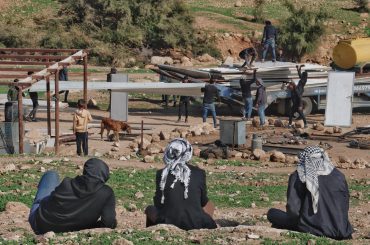
The school in Ein Il Hilwe is a simple tent with plastic chairs
Ein Il Hilwe is a Bedouin community located in the north of the Jordan Valley in the occupied West Bank. It is one of many Palestinian communities doomed to suffer de-development and stagnation under the strict policies of Area C. The village consists of around 130 people and is strategically located next to one of the few natural springs in the Jordan Valley that has not been confiscated by the Israeli government.
The village itself is located off of the main highway in the Jordan Valley, at the foot of surrounding hills. Taken out of context of the Israeli occupation, Ein Il Hilwe seems to be a picturesque manifestation of simplicity and tranquility. Unfortunately for the residents of the community, the occupation is omnipresent and unlikely to retreat soon; Ein Il Hilwe is surrounded by five illegal Israeli settlements inhabited by settlers who often come and harass the villagers. Like many other villages in Palestine, the effects of the occupation are perhaps most strongly felt by the children of the community.

Only 35 students from Ein Il Hilwe and the surrounding communities can use the school
Children from Ein Il Hilwe, as well as those from surrounding Bedouin communities, used to travel to school in the village in Tayasir, a trek of over 13km that required taking a bus and passing through an Israeli checkpoint. Too often, however, children would face harassment from the soldiers manning the checkpoint. Some were even forced by the soldiers to abandon the bus and walk the 13 km to and from school. Understandably, the brutal treatment from Israeli soldiers forced many of the children to drop out of school. To combat the falling retention rate and to support the existence of the Ein Il Hilwe community, the Save the Jordan Valley Campaign constructed a simple tent school last November. The school can hold 35 children, though many have classes outside, sitting on small plastic chairs where volunteer teachers instruct Arabic, English, Math, Chemistry and Religion, though classes include students of all ages and levels. Unfortunately, because the tent school in Ein Il Hilwe was illegally constructed (according to the draconian rules imposed by the defunct Oslo Accords), it is not recognized by the Palestinian Ministry of Education and therefore receives no funding from the Palestinian government and considered illegal by the Israeli government. The tent and the play area, as well as the cost of transportation for teachers and all school supplies were all provided by developmental organizations. Indeed, the success of the school is entirely dependent on charity.
On Saturday February 26, I attended an advocacy function in Ein Il Hilwe organized by the Save the Jordan Valley Campaign and Ma’an Development Center, during which volunteers helped extend the current play area for the children and met with the leaders of the community. Volunteers were meant to construct a second tent classroom for the community which would have allowed an additional 65 children to attend school, but on Friday, February 25, military jeeps arrived in the town and threatened to demolish both the tent and the existing play area.

The entire community of Ein Il Hilwe is located in a firing zone
Unfortunately, the situation in Ein Il Hilwe is not isolated. Communities throughout Palestine and particularly in the Jordan Valley are subject to the same horrifying circumstances. Area C – meaning full Israeli administrative and military control – extends to over 95% of the Jordan Valley. Most devastating about Area C is the inability of Palestinians to construct, leaving Palestinian communities in a constant state of, at best, stagnation and, at worst, de-development. Between 2000 and 2007, only 6% of Palestinian building permit requests were approved; 91 permits were granted to Palestinians while 18,472 Jewish units were built during the same period. For every building permit that Israel approves for Palestinians, it issues 55 demolition orders.
The students of Ein Il Hilwe are not alone in their suffering either. The Ka’abneh village is another Bedouin community that is surrounded by settlements. Like Ein Il Hilwe, a school was constructed for the community illegally, providing education to 66 students. Over the last three years, the Ka’abneh school has been issued six demolition orders, the most recent in October 2010 for a small bathroom. Likewise, the Jiftlik School faced a similar fate before 2005. Like their compatriots in Ein Il Hilwe, students from Jiftlik were forced to travel to nearby Beit Hassan to go to school. After the construction of the Hamra checkpoint, many from Jiftlik dropped out due to high transportation costs and harassment from Israeli soldiers at the checkpoint. The village decided to build a tent school, similar to the one in Ein Il Hilwe, but Israel demolished the school seven times between 2003 and 2008.

Israeli soldiers threatened to demolish the school last week
The Palestinians of the Jordan Valley are under constant attack. Not only does Israel use guns, but also bulldozers and lawyers to force Palestinians to leave their land. In 1967 320,000 Palestinians lived in the Jordan Valley. Today, that number has been reduced by 82.5% to a mere 56,000. Poverty rates soar to 60%, worse than most areas in Gaza. Perhaps most tragic is that students in the Jordan Valley are actively refused their legal right to education by the Israeli occupation. Harassment by soldiers and settlers alike as well as the inhumanely routine practice of school demolition denies Palestinian children the right to learn.
Article 50 of the 4th Geneva Convention requires the occupying force – in this case Israel – to ‘facilitate the proper working’ of schools in the occupied territory. Harassing students, destroying schools and implementing policies undermining Palestinian education is a clear violation of this and many other international laws – including the Convention of the Rights of Children and the Convention against Discrimination in Education. More importantly, the damage done to schools and students today is greatly limiting and handicapping the future generations of Palestine.

The students of Ein Il Hilwe are only one example of how Israel violates international law by denying education
This post originally appeared on Notes From a Medinah





